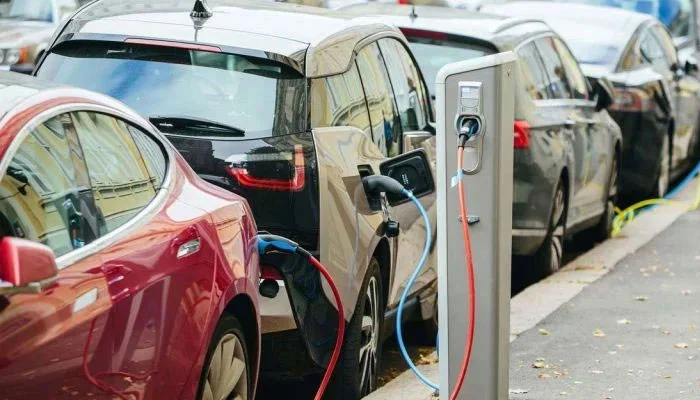Pakistan has taken a bold step toward green mobility by launching a comprehensive Electric Vehicle (EV) Subsidy Policy for the years 2025 to 2030, backed by an allocation of Rs. 100 billion. This strategic initiative is not only aimed at promoting clean transportation but also at reducing the country’s reliance on fuel imports and encouraging local EV manufacturing.
The five-year policy will target mass adoption of two- and three-wheel electric vehicles, particularly e-bikes and e-rickshaws, through a well-structured financial subsidy program that prioritizes transparency, accessibility, and inclusion.
Core Objectives of the EV Policy 2025–2030
- Accelerate EV Adoption: Ensure that at least 30% of all new vehicle sales are electric by 2030, focusing on two- and three-wheelers which dominate the local market.
- Cut Fuel Imports: Reduce Pakistan’s annual dependence on imported petroleum by shifting consumers to domestic electricity.
- Lower Emissions: Significantly cut urban air pollution by lowering tailpipe emissions, with a target of reducing 4.5 million tons of CO₂ by 2030.
- Boost Local Production: Foster domestic EV manufacturing by localizing up to 90% of two- and three-wheeler parts by 2026.
- Digital Disbursement: Launch a fully digital, paperless platform for subsidy applications, approvals, and fund transfers to ensure speed and transparency.
Initial Rollout and Year-One Allocation
The first fiscal year (2025–26) will see a direct Rs. 9 billion allocation, earmarked to subsidize:
- 116,000 electric motorcycles (e-bikes)
- 3,171 electric rickshaws (e-rickshaws)
To ensure equity and inclusion, 25% of the total subsidy share is reserved for women a move that encourages female ridership and ownership in the clean transport sector.
Carbon Tax and Tariff Reform for EV Promotion
To fund and reinforce this policy, Pakistan plans to introduce a carbon tax on petrol and diesel, gradually increasing to Rs. 5 per liter by mid-2027. This tax structure aims to discourage internal combustion engine (ICE) usage while generating revenue to support EV incentives.
Additionally, new tariff reforms are being introduced to reduce customs duties and regulatory taxes on EV parts and batteries, making local production more viable and reducing upfront costs for consumers.
Projected Economic and Environmental Gains
The EV policy is expected to generate significant long-term benefits:
- Fuel Savings: An annual reduction in fuel imports of around Rs. 283 billion, equivalent to approximately $1 billion, by substituting petrol and diesel with domestically produced electricity.
- Cleaner Air: With a targeted emission cut of 4.5 million tons of CO₂, cities will experience lower pollution levels, improving public health and urban livability.
- Job Creation: A thriving local EV manufacturing ecosystem will generate new employment opportunities in engineering, technology, maintenance, and supply chain sectors.
Infrastructure Expansion and Future Vision
The success of the EV policy is also tied to parallel infrastructure development. Key initiatives include:
- Establishing public charging stations on highways and in urban centers.
- Implementing battery-swapping facilities for commercial e-bikes and delivery fleets.
- Mandating EV-supportive building codes in urban planning to facilitate home and commercial charging units.
The government also plans to work closely with private sector players to scale up R&D, innovation, and user-centric EV models that suit Pakistan’s road conditions and energy constraints.
Summary at a Glance
| Policy Element | Details |
|---|---|
| Total Subsidy Value | Rs. 100 billion (2025–2030) |
| FY 2025–26 Allocation | Rs. 9 billion |
| Units to Be Subsidized | 116,000 e-bikes, 3,171 e-rickshaws |
| Female Rider Quota | 25% of initial subsidy |
| Emission Reduction Target | 4.5 million tons CO₂ by 2030 |
| Fuel Savings Estimate | Rs. 283 billion annually |
| EV Localization Target | 90% of 2- and 3-wheeler parts localized by 2026 |
| EV Market Share Goal | 30% of all new vehicles electric by 2030 |
Final Thoughts
Pakistan’s Rs. 100 billion EV subsidy policy is a clear signal of its commitment to a sustainable, modern, and inclusive transport future. With government reforms, international support, and private-sector partnerships aligning, the policy lays down a strong foundation for a national EV ecosystem.
Through financial incentives, smart regulations, and infrastructure expansion, Pakistan is poised to not only reduce its carbon footprint and fuel import bill but also become a regional hub for affordable electric mobility.



Comments (0)
No comments yet. Be the first to comment!
Leave a Comment